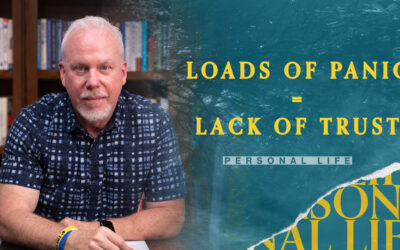This one component makes everything better.
We know:
- Better decisions create better lives.
- Good decisions result in better relationships.
- Better decisions make better churches.
And, wisdom produces those better decisions. Here’s the main key to better leadership:
Wisdom increases effectiveness.
Too often, we blunder and blame.
We make a bad decision and blame it on God. Oh, not exactly. We spiritualize it in a way that doesn’t really blame God, but it lets us off the hook for making a bad call. “I guess it wasn’t meant to be.” “God didn’t want it to happen.” We even preface some unwise initiatives with “God wants us to …” (That’s dangerous.) None of these statements help. God didn’t blunder, we did. Blaming Him might feel better in the moment. But, we know internally we made the call.

Your daily life as a leader includes decisions on multiple levels. Personal, interpersonal and organizational initiatives and challenges all demand them. And, the quality of those decisions determines the quality of your results.
Additionally, each decision starts with a thought, whether realized or not. Either consciously or subconsciously, you determine what you do. Sure, pressures push in from all sides. But, it’s still you. You pray and ponder. You evaluate and consider. People weigh in. But that decision is still yours.
We make our decisions, then our decisions make us.
You decide.
Of course, we know God is in control. He operates and leads. He convicts and directs. Yet, we also know God can influence your decisions, but the decisions themselves rest with you.
He is the same God everywhere. Yet in some churches and in some organizations, things go a whole lot better.
Why?
Because the leaders tap into wisdom to make better decisions. And the better your decisions, the better everything in your sphere of influence goes. It doesn’t mean perfect. It doesn’t mean you won’t face problems. The presence of wisdom doesn’t mean life will be easy.
But, when you use wisdom, situations will run smoother and outcomes will be stronger than if you don’t use wisdom.
We need wisdom. Every day in every decision, greater wisdom produces greater results. Better results. Fewer problems. More impact. More God-honoring ministry and more people doing the ministering.
Furthermore, God wants us to have wisdom. That’s why He gave us the books of Proverbs, Ecclesiastes, Song of Songs, Psalms and various parts of the other sixty-two books in the Bible.
He also tells us: “Therefore do not be unwise, but understand what the will of the Lord is.” Ephesians 5:17
One Example of How Wisdom Increases Effectiveness
If you (excuse me, when you ) get aggravated and unleash your aggravation on the people in your church/organization, that action lacks wisdom.
Here is why…
The leader who lashes out at people violates the following principles. With each principle, check yourself before you speak:
- “In the multitude of words sin is not lacking, But he who restrains his lips is wise.” Proverbs 10:19
- Why do I feel I must say this?
- “There is one who speaks like the piercings of a sword, But the tongue of the wise promotes health.” – Proverbs 12:18
- Will the words I’m considering bring health or pain?
- “The tongue of the wise uses knowledge rightly, But the mouth of fools pours forth foolishness.” – Proverbs 15:2
- Is there a better way to say this?
- “The wise in heart will be called prudent, And sweetness of the lips increases learning.” – Proverbs 16:21
- Will people taste sweetness or bitterness if I say what I’m thinking?
- “Even a fool is counted wise when he holds his peace; When he shuts his lips, he is considered perceptive.” – Proverbs 17:28
- Is this more about my own self-interest than it is leading well?
- “Scoffers set a city aflame, But wise men turn away wrath.” – Proverbs 29:8
- Am I trying to “light them up” or “set them on fire”?
- “A fool vents all his feelings, But a wise man holds them back.” Proverbs 29:11
- If I say this, what am I holding back?
When you verbally vent, things get worse.
We can justify it. We might try to muster a defense as to why we did it. But, “letting them have it” verbally carries consequences. You will face emotional reactions from others, upset people, hurt feelings and even more aggravation. Yes, you “got it off your chest”, but you dumped it upon everybody else. That lack of restraint will cost you more than if you had held your tongue.

It costs you:
- more time to mop it up than if you had “held your peace”
- influence, because people are less likely to trust you
- relationally, because you became less approachable
- organizationally, because you added anxiety that requires energy, sapping it from fulfilling your mission.
You may have been on the receiving end of this kind of verbal regurgitation. I know I have. It carries residual impact. That episode still smacks internally when I recall it. Wisdom dictates we choose another way to resolve our anxiety.
Wisdom does increase effectiveness. It always does. Even if things get worse, they would have gotten a whole lot worse without wisdom. Gratefully, I have also seen remarkable examples of wisdom in the lives of other leaders.
In our next post, we will look at four ways we can increase our wisdom. It produces great results, and I know it will for you.
Who We Are
LeaderINCREASE helps leaders get clear on where to go and understand how to get there, with less hassle. We understand that choosing to make a difference as a leader isn’t always the easiest.
We focus on providing leaders with resources they need to make a difference and become actionable leaders for their organization. We look forward to helping you achieve your goals as we have done for many others.




